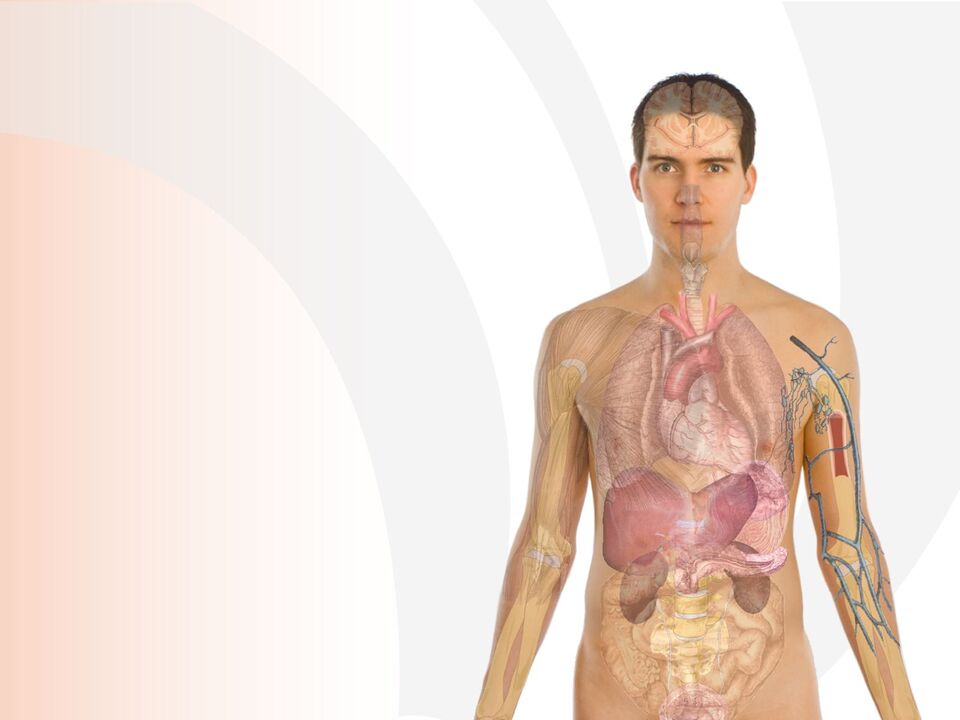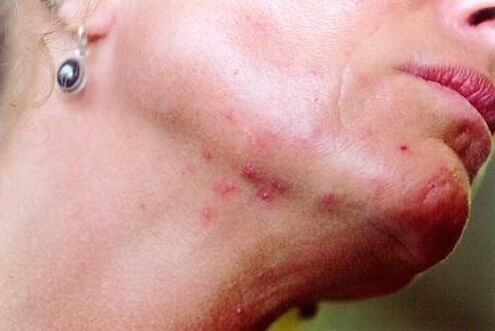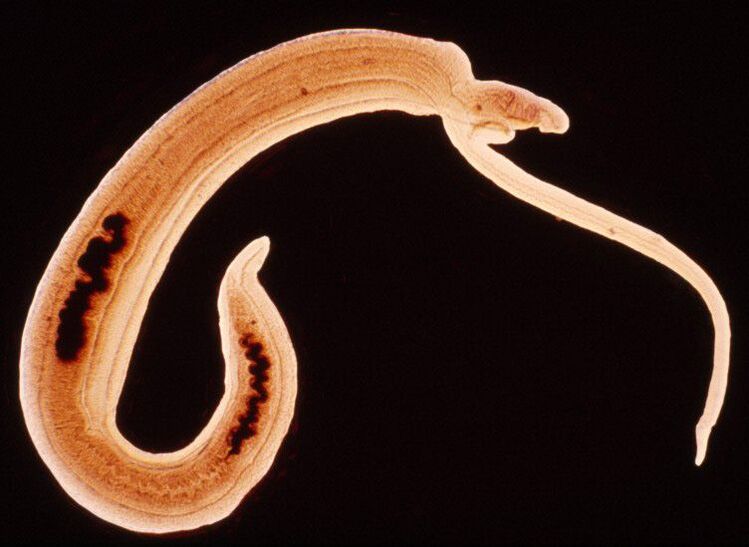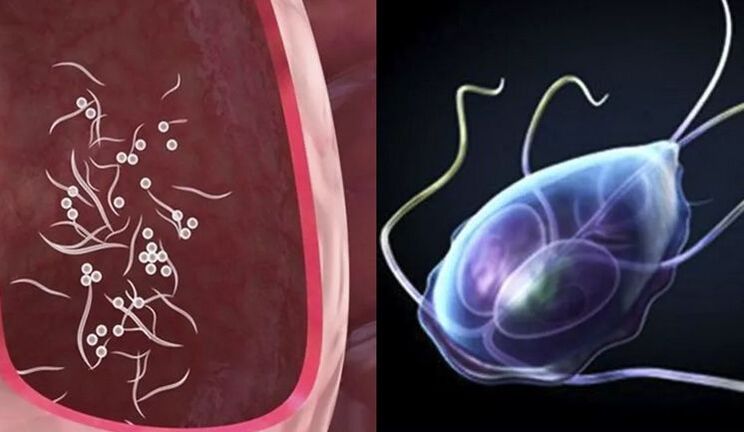The symptoms of a worm infection are different. For example, dyspeptic disorders most often occur - nausea, vomiting, pain and bloating. Some patients do not pay attention to the symptoms until they experience a rash that cannot be eliminated by conventional medication. Often, helminthic invasion is accompanied by symptoms similar to other diseases and allergies. Therefore, timely diagnosis is required.

Worm infections in humans
Most helminths spread into the human body by eating unwashed fruits and vegetables. After spreading throughout the body, damage to organs occurs, which causes serious illness. Pathology of the liver, kidneys, heart, gastrointestinal tract, gallbladder, and even oncology can develop.
Frequent characteristic symptoms are skin irritation, rash. But one may not pay attention to this for many years, while the pathology develops, even if it is enough to take anthelmintic medication in the course to fully recover.
Methods of infection
There are 4 methods of spreading worms into the human body:
- Geohelminthiasis. Parasites enter through the soil remaining on unwashed fruits and vegetables and spread into the water. Also, infection may occur with poor hand washing after working with soil. Contact with the ground is often observed about animals entering the house with dirty feet. Eggs, larvae, adults can enter the human body.
- Contacts. In the host body, females lay 4-5 thousand eggs in 1 day. They can spread from an infected person to others after contact, especially indoors. Eggs or adults are spread through bedding, towels, personal hygiene items. It is enough for infected people not to wash their hands. Often, this route is characteristic of pinworms, worms.
- Biohelminthiases. Parasites are stored in the bodies of living and dead animals, fish. After that, one can eat it. Preservation of parasites was observed with inadequate heat treatment.
- Insect bite. In this way, helminth eggs with the smallest size are delivered.
Of all the forms of helminths, infection most often occurs through the ingestion of eggs and larvae. They can be found in soil, water, in infected people, in raw meat. It is important not only to wash food and hands, but also to always use heat treatment for food.

Symptoms of helminthiasis
The symptoms of an attack vary depending on the stage of the disease.Often, the following symptoms appear:
- weight loss, thin;
- pale skin;
- itching in the anus.
The symptoms are similar to other pathologies, so the patient may be using the wrong method of therapy. Symptoms may vary depending on the area of the body affected. For example, with liver damage, jaundice of the skin occurs.
Gastrointestinal dysfunction
With the penetration of pathogens into the gastrointestinal tract, the following symptoms develop:
- violation of the formation of fecal mass (constipation, diarrhea);
- itching in the anus;
- dyspeptic disorders - nausea, vomiting, abdominal pain, heartburn;
- colic in the intestine;
- bloating, accompanied by swelling;
- weight changes periodically from larger to lower.
In the early stages, the symptoms are almost invisible. The more worms damage internal organs, the more active the symptoms develop. Some parasites are able to secrete foreign wastes into the body. This leads to severe intoxication and diarrhea. Large worms spread throughout the intestine, blocking the passage of feces. This causes constipation.
Due to the release of worm waste products, a person suffers from severe intoxication. That is why weakness, malaise, dyspeptic disorders develop.
Immune suppression
When a person consumes food, nutrients enter the body and are distributed throughout the tissues.Helminths eat it, so patients experience the following abnormalities:
- hypovitaminosis;
- metabolic diseases;
- suppression of the immune system.
A person often begins to get sick with viral, acting, fungal diseases. Even with the use of multivitamin preparations, hypovitaminosis will not be eliminated until anthelmintic treatment is completed.
Neurological disorders
Some types of helminths are capable of damaging peripheral tissues of the nervous system, crossing the blood-brain barrier. These properties are possessed by their intoxicating products.Damage to the nervous system causes the following symptoms:
- persistent forgetfulness, poor memory;
- headaches up to migraines;
- dizziness;
- stress, neurosis, depression;
- increased fatigue.
Patient behavior changes. He conflicts with the people around him, forgetting his acquaintances. Gradually, the symptoms increased, the body temperature rose more than 39 degrees.

Chronic hypovitaminosis leads to chronic fatigue syndrome. Gradually, red blood cell levels decrease, causing anemia. The person becomes irritable and aggressive.
Respiratory disorders
Even in the early stages, damage to the deepest part of the airways can develop.The following pathologies develop:
- tracheitis, bronchitis;
- emphysema, bronchial asthma, pneumonia.
Signs of helminthic invasion can even be frequent rhinitis and pharyngitis.
Skin problem
For the epidermis to grow normally, adequate amounts of vitamins, trace elements and minerals are needed. Worm attacks lead to hypovitaminosis, so the quality of the skin suffers.The following deviations appear:
- acne, pimples, rashes;
- itching, peeling, redness of the epidermis;
- nail plate exfoliation.
Even the most severe skin pathologies can develop:
- urticaria, dermatitis;
- papilloma, seborrhea;
- allergic reactions.
Doctors and patients may not immediately understand why medications do not help with this pathology. The quality of the skin deteriorates significantly, it becomes pale, wrinkles appear. Turgor is reduced, that is, surface tension.

The signs of infection depend on the type of helminths
The severity of symptoms depends on the following factors:
- the number of parasites in the body;
- level of immune activity;
- parasite localization;
- a kind of parasite.
Some helminths can stay in the host for a long time without causing negative symptoms. Other individuals are capable of immediate deterioration of health, damaging the liver. For example, a ringworm.
Bracelet worm
Ascaris damages many internal organs, causing certain symptoms, similar to other diseases.The following symptoms may appear:
- hyperthermia;
- prolonged cough;
- severe fatigue;
- bronchitis, pneumonia.
First, the gastrointestinal tract is damaged, therefore, hypovitaminosis and metabolic disorders are formed. The human body is shrinking. Gradually, signs of damage to the gastrointestinal tract form:
- yellowing of the skin;
- intestinal obstruction.
With the spread of worms through the blood-brain barrier, severe headaches, migraines, and depressive states appear.
Schistosomiasis, trichuriasis, ankylostomiasis, diphyllobothriasis
Parasites cause the following abnormalities:
- lack of nutrients and vitamins;
- reduces metabolism, causing weight changes;
- intestinal dysbiosis.
Gradually, hypovitaminosis turns into beriberi, which leads to significant body deficiency. A person's skin becomes pale, he often faints, which is typical for anemia.
cream worms
Pinworms are characterized by the deposition of eggs in the anus, usually this process occurs at night. Therefore, one is worried about severe itching in the anus. The disease is characterized by periodic remission, so sometimes the itching stops. In the absence of treatment, helminthic invasion becomes widespread, so itching worries the patient at any time of the day.
Trichinosis
Parasites penetrate any part of the body, producing large amounts of toxins. This leads to constant cramps, spasms, muscle aches. Due to damage to the cardiovascular system, edema is formed. With severe intoxication, body temperature rises.
Fascioliasis, opisthorchiasis, clonorchiasis
This is one of the most dangerous helminths, leading to the following lesions:
- difficulty in the liver with the development of jaundice;
- intestinal obstruction, dyspeptic disorder when spreading along the gastrointestinal tract.
Gradually, the patient develops hepatosplenomegaly.
Urogenital schistosomiasis

Parasites actively spread through the genitourinary system. Due to the chronic inflammatory process, damage to the mucous membranes occurs. Therefore, when urinating, a person detects red urine, indicating the development of a bleeding focus.
Worm habitat
In the human body, helminths can damage many types of organs:
- vlasoglav - large intestine;
- ascaris, tapeworms, hookworms - small intestine;
- ringworm - liver.
Depending on the damaged organ, different symptoms form:
- liver - jaundice, pain in the right hypochondrium, hepatitis;
- respiratory tract - trachea, bronchitis, pneumonia;
- brain - seizures, paresthesia, fainting.
Simultaneous treatment of diseases (hepatitis, colitis), elimination of helminths is required.

Ordinary helminths
Scientists count a large number of parasites found in the human body. There are more than 100 of them in total.But more often, doctors distinguish infections with the following parasites:
- cream worms;
- dwarf tapeworms;
- tape worm;
- mine worms;
- whip worms;
- paragonimiasis;
- cysticercosis.
To determine the exact type of pathogen and prescribe the correct treatment, it is necessary to carry out laboratory and instrumental diagnostics. First, the patient is examined by a therapist, then he gives the stool for a coprogram, the detection of worm eggs. Usually, therapists and infectious disease specialists recommend undergoing a double study, because even in the presence of infection, eggs and larvae may not be detected.
Laboratory blood tests are recommended for at -risk patients:
- the presence of pets;
- animal -related work;
- medical workers;
- employees of children's educational institutions;
- food workers.
Attention! To accurately identify helminths and their intoxicating products, it is recommended to conduct enzyme -related immunosorbent tests. It is performed in municipal clinics and hospitals, as well as private laboratories.
Methods of Therapy
It is forbidden to choose drugs independently against helminths, as they greatly affect the condition of the liver and kidneys. It is recommended to undergo an initial examination, after which certain medications are prescribed. The dose chosen depends on the state of health, age, weight of a person.
The following methods of drug administration are selected:
- tablets - mild or moderate degree of helminthiasis;
- injections, infusions - the degree of severe disease, the formation of large numbers of parasites, severe damage to the digestive tract.
Many drugs can only act on adults. If there is a risk of eggs and larvae, it is better to undergo a second course of therapy or choose a more effective drug.
The table shows the optimal drugs for treatment.
| material | Influence |
| mebendazole | Completely kills cream worms, mine worms, whip worms, tapeworms and other parasites |
| Pyrantela pamoat | This substance destroys ringworms, effective in enterobiasis and necatorosis |
| Levamisole hydrochloride | Destroy ringworms and mine worms |
| Pirvinia embonate | Helps cure enterobiasis completely |
| Albendazole | It helps destroy most elements at the adult or larval stage. |
Initially, it is recommended to identify the exact pathogen, only then apply the drug. This will increase the chances of recovery without negative effects on the body.
Methods of prevention
To prevent the entry of parasites into the body, use the rules of prevention:
- washing hands after returning home, throughout the day, after contact with animals;
- use of personal hygiene items, meals only by one person;
- taking multivitamins, abandoning bad habits to strengthen the immune system;
- washing fruits and vegetables thoroughly, heat treatment of meat and fish;
- the use of high quality drinking water from proven sources.

Helminths can be found in many products, so it is impossible to exclude the risk of their spread into the body. Anyone can be infected with the parasite without knowing it. It can spread from one family member to another through household contact. Therefore, it is necessary to use preventive measures on a daily basis.
It is important to take good care of animals. It is required to wash it periodically, to give medicine from parasites to reduce the risk of helminth infection.
If a person suspects that he is charged with helminths, it is better to take timely laboratory tests. It was repeated twice to avoid a false negative test. Self -administration of drugs is prohibited. All of them are strong, negatively affecting the liver. Only a doctor will be able to choose the optimal anthelmintic agent with the right dose. If timely treatment is carried out, it is possible to prevent the development of serious diseases, immune deficiency.
























